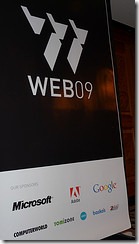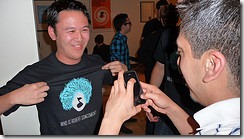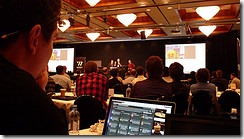NZsynth and WEB09
It started as a conversation I was having with Brett Roberts regarding options for promoting NZ online at a time when tourism was taking a hit from the current economic climate. From there we discussed the proposed National Cycleway and this lead to a conversation about “crowd sourcing” images that people have already tagged as New Zealand to construct a demo from our shipping Silverlight 2 technology.
This conversation tied in well with a looming keynote slot at WEB09 where I had a 5-10 minute demo slot. The biggest problem was that I only had three days to build the “demo-ware” prototype and present it to a room full of web influential's!
Needless to say after a nervous period fighting with the failing conference WiFi. I switched to the hotel wireless and pulled it off!
Watch a 6 1/2 minute video of the demo I showed at the conference (this time the video is hosted on a US based server so the experience won’t be as good for Kiwis as the demo further down this post).
I have also posted this video on Vimeo (download available).
The demo app is hosted on a development server at Swizzle in their Telstra Albany datacenter. The fact that server was only 1 hop away from the conference venue meant that I could stream video via wireless at 2.4 MBS over the hotel wifi using smooth streaming with NO CACHE! I would go as far as saying that this was the Best Quality Internet Video that people in the room had ever seen stream over the Internet and all this in an environment when no other presenter could get their “US” based video to play without buffering! Goes to show the importance of peering for local content!
As mentioned at the event the “Excellent" video was generously provided by Making Movies for use as stock footage in the demo.
If you are in New Zealand and have a direct connection to the Auckland Peering Exchange I recommend that you try the demo steps for yourself by navigating to https://possi.bility.co.nz.
WEB09 Demo V1
1) Use the mouse wheel to zoom in and out of the Mosaic and the slider to switch between Mosaics with more or less tiles.
Needless to say there was some smoke and mirrors in play during the demo…
Key combinations to try
- SPACE bring up photo, mouse click on the image to hide again.
- Q to show my photo collection (click on faded background then W to hide)
- A to show a photosynth of museum S to hide
- Z to show a photosynth of statue (P inside the photosynth to hide photos and show 3d model) S to hide
- X to show a photosynth of blackout protest
- V to show smooth stream video B to hide (needs to be done last)
In retrospect I didn’t like the way that the watermarked text that I applied to each individual photo tile looked after it was added to the mosaic. Also the tiles were being cut when they were being laid out in the Mosaic so in some cases (like below) the watermark attribution was being partly obscured or not visible at all!
For stage two I wanted to figure out a way to get rid of the watermark all together and work out a way to make individual photos in the Mosaic clickable.
I hadn’t been able to solve this problem in my demo so I used SPACE to bring up a single photo to show my thinking but not having it working.
Tim Tait came up to me after the keynote and we started discussing how I had built the demo and how he could look at productionizing the code for an upcoming exhibition at Te Papa museum in Wellington. Following our conversation I invited Tim to the Expression For Art’s Sake event in Wellington the following week and the rest as you say is history. Tim was able to solve the big problem I had above and this lead to me building a V2 of my demo which I will show you soon.
Before this week I had hardly touched Silverlight and now I don’t think I can live without it. Even though Silverlight is very different from Flash, I think having that Flash background let me pick it up fairly quickly.
I will post again shortly with a more detailed description of how I built the demo above including source code and a preview of Version 2 inspired by Tim’s work. But in the meantime it worth calling out the great piece of software Andrea Mosaic that I purchased to pull the base 3 Gigapixel tile sets.
Read Part Two about how it was done…
Comments
Anonymous
May 13, 2009
PingBack from http://rob-the.geek.nz/2009/05/awesome-siverlight-photosynth-demo.htmlAnonymous
May 17, 2009
Previously I wrote and demoed the NZsynth application that was built for the WEB09 keynote. This post









